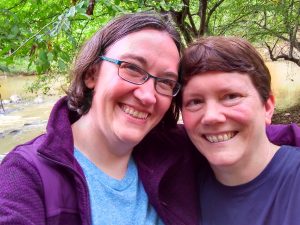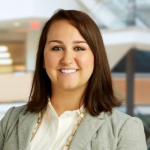At SAS, we have a multidimensional culture that blends our different backgrounds, experiences, and perspectives from employees all over the world. As the Diversity and Inclusion Manager, I’ve had open conversations with employees regarding the value that neurodiversity brings to the creative process and to our organization.

But I’m not the expert here, because I myself do not identify as autistic. That’s why, when it comes to conversations about neurodiversity and what it means to be autistic, it’s important to hear firsthand about the experiences and perspectives of actually autistic people.
Our own Angela Broach, a Solutions Consultant, offered to share her story in light of Autism Awareness and Acceptance Month - because she’s a woman in tech, a mom, a software superstar, and she’s also proud to be autistic. Read on to learn more about Angela’s journey and why there’s no such thing as “normal”.
I’m Angela, and I’m on the autism spectrum.
I think differently than most people.
It makes me a better programmer, but a lousy social butterfly.
I bounce my legs a lot when I’m anxious.
Watching sports bores me to tears.
I often find solutions to problems that other people may miss.
Crowds of people make me nervous.
I can’t stay angry for very long.
I prefer to stay out of the spotlight.
I stink at lying – even white lies.
These traits aren’t typically considered “normal.”
These distinctions don’t make me better or worse – they just make me a little different.
Realizing I was autistic – better late than never!
I discovered I was on the autism spectrum as an adult, just a few years ago. I was struggling to understand why my partner was upset with me for “not listening” when I thought I was doing a great job. After all, I was paying full attention to her, and even tried active listening! She still felt like I wasn’t hearing her. Needless to say, it was very frustrating for both of us.
I was finally referred to an online test for autism, and I tested positive. After my diagnosis, I started doing some research, and things started to make more sense. I knew that interacting with other people often confused me and that social situations had long been uncomfortable, but I’d never associated any of that with being on the spectrum. Through my research, I even ended up finding out my entire birth family is on the spectrum, and we all struggle with the outside world being confusing to us.
Finding out that I’m autistic has been life-changing. I now have names for behaviors like stimming and a way to explain myself to others when I misinterpret their feelings. I now understand that others think I’m “not listening” because I’m not picking up on their emotional signals, but it’s not because I’m inattentive. I can now request that my friends and family communicate their emotions more clearly to me, so they know that I’m not ignoring their feelings. My diagnosis hasn’t been a fix-all for relationships by any means, but it does lend itself to more honest discussions and healthier relationships.
There’s no such thing as “normal”
I don’t obsess over how I can fit into “normal” society better. Instead, I focus on deciding where I want to fit in and where I don’t. For example, I don’t want to be a fancy socialite. The idea of dressing up all the time – especially high heels – is horrifying to me. That’s OK though - other people can (and will) fill those roles. It’s just not for me.
So, where do I want to fit in? I like thinking about new ideas, building things, and solving problems. That dovetails perfectly with writing software. I want to be a good person. I’m good at my job, and I’m a dependable friend. I have a wonderful partner and two teenage kids who like me (and will occasionally even confide in me)! I fit in where I want to fit in, and I’m happy with that.
I’m proud to be autistic
I’m proud to be on the autism spectrum. And I’m in good company – some of the world’s most renowned innovators like Albert Einstein, Sir Isaac Newton, and Mozart, - were on the spectrum too. People with autism have made, and continue to make, great contributions to science, technology, and society. And it’s their autism – their neurodiversity – that allows them to be so inventive.
Our differences make us who we are, and our collective neurodiversity moves the world forward one discovery at a time. I hope my story inspires others and encourages everyone to seek out and value neurodiversity. After all, there’s no such thing as “normal”!
This April, I hope you’ll join me recognizing the importance of autism acceptance and neurodiversity. You can share your support by using #AutismAcceptance on social media to show there’s no such thing as normal – just different.
…
Thank you, Angela, for sharing your story! Today and every day, we’re thankful for the invaluable contributions of our employees on the autism spectrum.
If you want to learn more and hear directly from people with autism, search #actuallyautistic for their perspective.

4 Comments
I love this post! Thanks to Angela for telling her story, and to Danielle for posting it here.
Wow. We've been confused by how to communicate with (and how to motivate) our 18 year old son, and it's never occurred to us to see if perhaps he is on the autism spectrum, but Angela's list at the beginning of this article could EASILY substitute for a list that he would create for himself. Aha moment. Thanks for sharing (and inspiring!). Wouldn't it be nice, if we, as fellow-human beings, could stop trying to fit everyone and everything in the "box of normal" and start simply OBSERVING the differences we see in the world, and STOP judging them?
You are welcome to email me. I think a lot of people are able to fit in enough to "pass". I certainly did! 🙂 It is helpful to be aware that not everyone has the same types of thoughts and sees things in the same ways. Of course communicating with and motivating teenagers is ALWAYS difficult no matter where they are on the spectrum!!!
Angela, thank you so much. I would love to take you up on the offer. This week has been tough as he's a student at UNCC. But let me get him home tomorrow, and I'll find you!